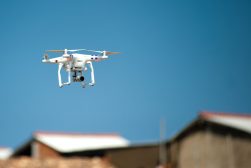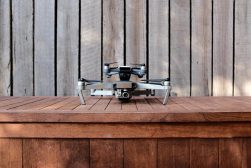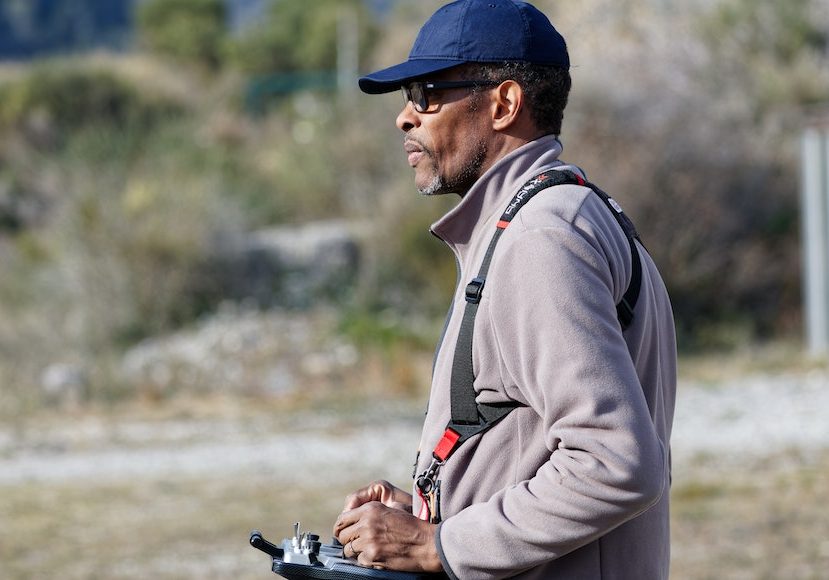
How to Become a Drone Pilot in 2023 (USA Guide)
If earning money by flying drones sounds like a dream job for you, this guide to becoming a drone pilot in the US is an essential read.
Welcome to the thrilling world of drone piloting, where opportunities abound across a wide range of industries.
With the potential for high earnings and an ever-expanding job market, now is the perfect time to consider a career as a drone pilot.
Let’s explore the steps on how to become a drone pilot, the industries where you can make your mark, and the benefits and challenges of this exciting profession.
How to Become a Drone Pilot: Key Takeaways
- Become a licensed drone pilot with FAA regulations, professional insurance and the right equipment.
- Prepare for and pass an FAA exam to get your Remote Pilot Certificate.
- Invest in quality gear, stay up to date on compliance requirements & continue learning for success as a drone pilot!
Table of Contents
Understanding the Role of a Drone Pilot
As a drone pilot, you’ll be responsible for operating unmanned aerial vehicles (UAVs) for various uses and industries, all while ensuring compliance with FAA regulations and guaranteeing safe and successful flights.
To become a commercial drone pilot, you’ll need a drone pilot license, professional drone insurance, and, of course, a drone.
Being a commercial drone pilot is quite different from flying drones recreationally.
Recreational drone pilots fly drones for their enjoyment, while commercial drone pilots are professionals who fly drones for organizations, government bodies, military organizations, and businesses in different industries.
Drone pilots with a Part 107 Remote Pilot Certificate issued by the Federal Aviation Administration (FAA) can work across numerous industries and enjoy potentially lucrative opportunities.
The role of a drone pilot is ever-evolving, as drone technology continues to advance and find applications in various fields.
With the growing economic demands and the rise of disruptive technology, it’s an attractive career choice to become a drone pilot for those who want to stay ahead of the curve.
As you embark on this journey, it’s essential to understand the path to becoming a licensed drone pilot and the FAA regulations that govern the industry.
The Path to Becoming a Licensed Drone Pilot
To become a licensed drone pilot, you must first obtain an FAA tracking number, prepare for and pass the FAA exam, and secure a remote pilot certificate.
Each step in this process is crucial to ensure that you’re ready to take on the responsibilities and challenges of piloting unmanned aircraft systems professionally.
Understanding the regulations and requirements of the FAA is essential to becoming a successful drone pilot. You.
Acquiring an FAA Tracking Number
The first step in the drone pilot journey is to acquire an FAA tracking number.
This number can be obtained by setting up an Integrated Airman Certification and Rating Application (IACRA) profile on the FAA’s website.
The IACRA is an online system used by the FAA to manage the certification and rating process for pilots and other aviation personnel, including aspiring drone pilots.
Once the IACRA profile is set up, the FAA will assign a tracking number to the IACRA profile.
Preparing for and Passing the FAA Exam
To become a licensed drone pilot, you must pass the FAA’s Unmanned Aircraft General (UAG) exam.
This exam consists of 60 questions on topics such as FAA drone laws and regulations, flight restrictions, aviation weather, airport operations, and maintenance operations.
You’ll need to score at least 70% to pass the exam and obtain an FAA airman certificate, also known as a Part 107 Remote Pilot Certificate or an FAA drone pilot license.
As unmanned aircraft operators, it is essential to have this certification to ensure safe and responsible drone usage.
Preparing for the FAA exam involves studying relevant materials and taking drone ground school courses.
There are various resources available to help you prepare for the aeronautical knowledge test required to become a certified drone pilot, such as the FAA’s free Part 107 test study guide, YouTube videos, and the highly recommended Drone Pilot Ground School.
Completing the Drone Pilot Ground School and passing the FAA exam will help you obtain a permanent remote pilot certificate, as the course boasts an impressive 99%+ success rate for those who complete it.
Once you’re ready to take the FAA exam, you can schedule an appointment at an FAA-approved Knowledge Testing Center.
Be sure to give yourself plenty of time to study and prepare, as the process of becoming a licensed drone pilot takes around seven weeks.
Securing a Remote Pilot Certificate
After passing the FAA exam, the next step is to secure a temporary remote pilot certificate, which will later be replaced by a permanent one.
This certificate confirms that you have a thorough knowledge of the regulations, operation rules and protocols for using drones safely.
It also proves that you are aware and adept at ensuring safety while operating drones.
To obtain a remote pilot certificate, you’ll need to fill out the FAA Form 8710-13 and pass a TSA security check.
It’s essential to keep your remote pilot certificate up to date by completing an online training course within the last two years.
This ensures that you stay current with industry trends and maintain your certification, allowing you to continue flying drones commercially and legally.
Registering Your Drone and Meeting Compliance Requirements

Wilbur Wright Building – FAA Headquarters. Credit: Matthew G. Bisanz, CC BY-SA 3.0, via Wikimedia Commons
Registering your drone with the FAA is a crucial step in becoming a professional drone pilot.
This registration ensures that you’re flying your drone in accordance with all relevant laws and regulations, which is vital to operating legally and safely in the commercial drone industry.
Drone pilots are required to register their drones with the FAA every three years.
In addition to registering your drone, you must also meet all compliance requirements set forth by the FAA.
This includes obtaining special airspace authorization if necessary, as well as following the FAA’s model aircraft guidelines for recreational drone operators.
By meeting these compliance requirements, you ensure that your drone operations are conducted safely and legally, protecting both your business and the public.
Exploring Career Opportunities for Drone Pilots

Credit: Tom Fisk
Drone pilots have a wealth of career opportunities available to them, with options for full-time, part-time, and freelance work in various industries.
Some of the industries that employ drone pilots include real estate, marketing, surveying, construction, entertainment, insurance, and mining.
With a Part 107 Remote Pilot Certificate, you can work across numerous industries and enjoy potentially lucrative opportunities.
Specialized knowledge in certain industries can greatly enhance your marketability as a drone pilot.
For example, understanding the specific needs of construction companies or real estate agencies can help you provide targeted drone services that add value to their operations.
By investing in industry-specific training, you can increase your earning potential and further your career.
The salary of a drone pilot in the United States typically averages around $68,966 annually or about $33 an hour.
The flexibility, potential for high earnings, and the growing job market make becoming a drone pilot an attractive career choice for those looking to enter a cutting-edge field.
Pros and Cons of Pursuing a Drone Pilot Career

Credit: Szabó Viktor
Pursuing a career as a drone pilot comes with its advantages and disadvantages.
Some of the benefits include flexibility, the potential for high earnings, and a growing job market.
The ever-evolving drone technology and its applications across various industries make this career choice highly engaging and full of possibilities.
However, there are some drawbacks to consider.
As a drone pilot, you’ll need to stay up to date with the latest regulations and technology, which requires continuous learning and skill development.
Additionally, you may have to travel for certain jobs, depending on the industry and project requirements.
It’s essential to weigh the pros and cons of pursuing a drone pilot career to determine if it’s the right path for you.
Investing in Drone Equipment and Insurance
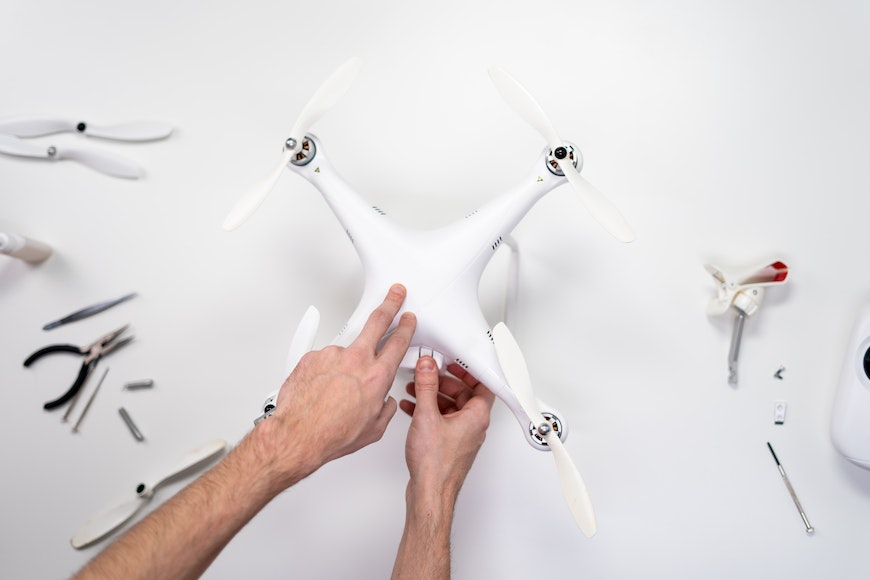
Credit: Cottonbro Studio
As a professional drone pilot, investing in high-quality drone equipment and insurance is crucial for your success.
Purchasing a drone that you can grow into, such as the Phantom 4 Pro or Inspire 1, will enable you to provide top-notch drone services to your clients.
Insurance is also an essential aspect of a professional drone pilot’s toolkit.
Reputable insurance providers such as DroneInsurance.com and SkyWatch.AI offer flexible plans that allow you to buy coverage for your drone flights whenever you need it.
Having comprehensive drone insurance ensures that you’re fully covered in case of any accidents, including coverage for your equipment, cameras, and potential damages.
Continuous Learning and Skill Development
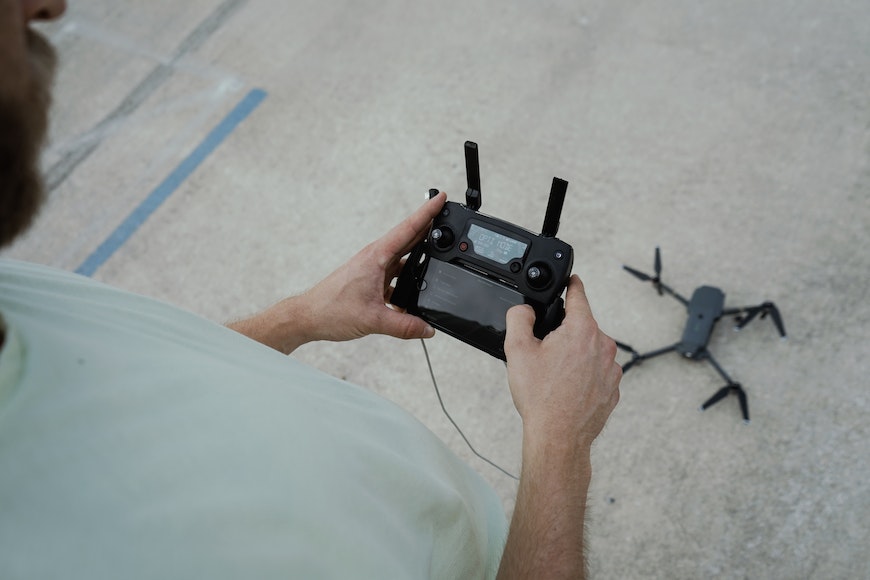
Credit: Kyle Loftus
Continuous learning and skill development are essential for drone pilots to stay updated on industry trends, maintain their certifications, and enhance their marketability in the competitive job market.
Developing skills such as good hand-eye coordination, spatial awareness, knowledge of regulations, and technology is crucial for being a successful drone pilot – see also these tips for taking photos with a drone.
Additionally, having problem-solving skills, attention to detail, discipline, and strong communication skills will greatly benefit your career.
Practising flying drones for fun is a great way to gain experience and improve your skills.
As with any profession, honing your craft and staying up to date with the latest advancements in the industry is vital for success.
By committing to continuous learning and skill development, you’ll be well-prepared to tackle the challenges and seize the opportunities that the world of drone piloting has to offer.
Final Words
Becoming a drone pilot offers a world of possibilities, with a wide range of industries to explore and the potential for high earnings.
By understanding the responsibilities and requirements of a drone pilot, obtaining a license, investing in quality equipment and insurance, and committing to continuous learning and skill development, you can embark on an exciting and rewarding career in this cutting-edge field.
So take to the skies and make your mark as a professional drone pilot.
Becoming a Commercial Drone Pilot: FAQs
Do drone pilots make good money?
Yes, drone pilots make good money.
According to ZipRecruiter, the median annual salary for drone pilots is around $80,000, with top earners making up to $160,000 per year.
Those looking to become drone pilots can expect a salary that varies greatly depending on their qualifications and experience.
Are drone pilots in demand?
Yes, drone pilots are in high demand.
Research and Markets suggest that the market for these professionals is expected to grow by over 50% in the next five years.
So now is a great time to consider a career as a drone pilot!
The demand for drone pilots is growing rapidly, and the market is expected to expand significantly in the next five years.
This presents an opportunity.
How do I start a career as a drone pilot?
To start a career as a drone pilot, the first step is to prepare for and pass the FAA UAG Unmanned Aircraft General – Small knowledge test.
After obtaining your FAA Remote Pilot Certificate, you’ll need to register your drone and purchase insurance before you can begin exploring career opportunities.
How long does it take to be a drone pilot?
Becoming a drone pilot is surprisingly simple.
With the right resources and dedication, it typically takes 4-6 weeks to get your FAA drone pilot license.
After passing your exam, you’ll receive your certification card in the mail 6-8 weeks later.
It typically takes 4-6 weeks for most people to get their FAA drone pilot license, after which they will receive their certificate card 6-8 weeks later.
Dedication and study habits can affect the time it takes to become a certified drone pilot, but with the right resources, it can be done fairly quickly.
What industries employ drone pilots?
Drone pilots find jobs in a variety of industries like real estate, marketing, surveying, construction, entertainment, insurance, and mining.
It’s an exciting career with lots of potential opportunities!
The job market for drone pilots is growing rapidly, and there are many different types of roles available.
From commercial pilots to aerial photographers, there is something for everyone.
With the right training and experience, you can become a successful business owner.
As the Content Manager of Shotkit, India Mantle brings with her a lifelong love for photography that she developed during her childhood, watching her father document their family moments with his Nikon EM. In her free time, you find her enjoying the awe-inspiring natural beauty of her home, Northern Rivers, Australia.





